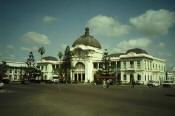- (august 2021)
Nations in crisis: Mozambique
(Part of a series on "Nations in Crisis")
Mozambique is one of the most beautiful countries in the world. It is also
one of the richest, in terms of natural resources.
It is also one of the poorest.
It has one of the highest rates of chronic malnutrition in the world:
43% of its children under 5 suffer from it.
More than a million people need food aid.
Mozambique is one of the countries that is the most severely affected by climate change: in 2019 it recorded two major cyclones in the middle and in the north
(Cyclone Idai and Cyclone Kenneth), while the south suffered from a drought.
Hundreds of people died.
Mozambique was a Portuguese colony until a revolution disposed of Portugal's
fascist dictator and the independence movement, Frelimo, seized power.
That was in 1975. About
250,000 Portuguese who lived and worked in Mozambique left.
Frelimo's leader Samora Machel became president of the independent
Mozambique in 1975.
Frelimo was a Marxist-Leninist group, aligned with the Soviet Union,
and instituted a one-party regime.
Afraid of Frelimo's anti-western and African-nationalist rhetoric,
Rhodesia (when it was ruled by the white minority, because it became Zimbabwe) and South Africa (when it was ruled by white minority, before the abolition of apartheid) funded an armed movement led by Afonso Dhaklama called Renamo.
This an independence war against Portugal turned into a civil war between Renamo
and Frelimo.
In 1986 Machel died in an air crash and was succeeded by Joaquim Chissano.
In 1989 the Soviet empire was collapsing, and the Berlin wall was physically
torn down, so Frelimo changed Mozambique in a less socialist state (although
far from capitalist) and legalized opposition parties (although far from
democracy). With the end of the Cold War and the end of apartheid in South
Africa (in 1991) the civil war became pointless: in
1992 Frelimo and Renamo signed a peace treaty.
Frelimo kept winning elections. Renamo didn't quite accept this fact and
occasionally tried to rebel, but in 2017 signed another peace deal with
Frelimo. However, this was no longer the communist movement of Machel.
For example, in
1994 president Chissano, who had received an honorary degree from a Hindu University, introduced mandatory meditation for all soldiers and police officers.
In 2004 Frelimo's candidate for president (and eventual winner of the election)
was one of the richest men in the country, Armando Guebuza.
Meanwhile in 2011 Italian energy company Eni discovered a giant gas field off the coast of north Mozambique,
the second largest gas field in Africa.
Alas, the north is precisely where an Islamist insurgency began.
It was the age of Boko Haram and ISIS. In
May 2018 Islamist militants of Ahlu Sunnah Wa-Jama beheaded ten people, the
first sign that the insurrection was significant.
In August 2020 the Islamists captured the port of Mocimboa da Praia, and in
March 2021 they attacked the northern town of Palma, where the French energy
company Total was investing 20 billion dollars to develop the gas field.
Total fled the country.
By then the cyclones and the drought had caused devastation all over the country.
In June 2021 the new president, Filipe Nyusi, begged African nations for help
to right the Islamists and
the 16-nation Southern African Development Community responded.
Rwanda (a tiny country but much richer than Mozambique) sent one thousand soldiers
and reconquered Mocimboa da Praia.
South Africa sent soldiers, ships and airplanes.
Botswana too sent a few hundred soldiers.
Angola and Zimbabwe are to follow suit.
The USA and the European Union tacitly approve the mission and have sent a handful of advisors.
The Islamists are, however, very different from the kind that became famous
in Afghanistan, Pakistan, Iraq and Syria, and even more different from the
ones that became famous in Nigeria.
Their devotion to Islam is debatable. They are mostly angry young men
who know that the country is rich in mineral resources but only the elite
benefits from them. Nonetheless, they come from a region that is mostly Muslim,
although the vast majority of Mozambique is Catholic (or was: the Marxists tried
to wipe out any vestige of religion), and that is increasingly creating the
feeling that this is yet another "jihadist" civil war.
The rest of the country is not exactly safe for its citizens. Kidnappings for ransom is widespread in major cities, often targeting business families of Asian origin: 13 kidnappings were reported in 2022, and those are probably just the tip of the iceberg. (Esmael Malude Ramos Nangy, accused of orchestrating several kidnappings over two decades, was finally arrested in January 2023 in South Africa).
Mozambique is a
country that has had the same party in power for almost 50 years,
doesn't have a free press (let alone an independent judiciary),
whose elections are routinely rigged (in the 2019 presidential elections European Union observers found irregularities in every province),
and where civil-rights activists risk their life
(Anastacio Matavel was murdered in October 2019).
It is no surprise that Mozambique is ranked by Transparency International
as one of the most corrupt countries in the world.
Rwanda and the other neighbors (and implicitly the USA and EU) are
defending such a corrupt government from the angry young men of the north
simply because they value political stability.
But Mozambique is a textbook case of when political stability might be the
very cause of instability.
In 2018 the former finance minister of Mozambique, Manuel Chang, was arrested in South Africa, accused of a giant corruption scheme that virtually bankrupted the country. For five years nongovernmental organizations within Mozambique fought to avoid that Chang be returned to Mozambique because his powerful friends would certainly help him go free. In 2023 South Africa finally accepted to extradite him to the USA, where Mozambiqans feel that he will truly be held accountable for his crimes.
TM, ®, Copyright © 2021 Piero Scaruffi All rights reserved.
Back to the world news | Top of this page
|

